
Henchmen of Pablo Escobar who have avoided prosecution may finally end up behind bars, thanks to a new report saying his Medellin cartel committed crimes against humanity, local media reported Friday.
Colombia’s Prosecutor General’s Office told the country’s Supreme Court Wednesday that the Medellin Cartel, which garnered $60 million per day in drug money at the height of its power, committed such crimes as part of a strategy to intimidate society.
The report focused on crimes that shook the country and damaged its democratic institutions, such as the cartel’s bombing of the El Espectador newspaper headquarters, and the Escobar-ordered slaying of Luis Carlos Galan, one of the country’s foremost leftist politicians. One of the few politicians to publicly denounce Escobar, he was killed during his 1989 bid for president.
If the court accepts these claims and Galan’s murder is declared a crime against humanity, it would allow prosecutors to open cases against criminals who now have impunity thanks to the country’s 20-year statute of limitations. Colombia imposes no time limits on the prosecution of crimes against humanity.
With statutes of limitations beginning to expire for crimes committed at the pinnacle of Colombia’s drug violence in the 1980s and 1990s, the country’s prosecutors have begun to redefine certain cases as crimes against humanity in order to buy an indefinite amount of time to investigate and press charges.
The “unusual legal concept,” as the Committee to Protect Journalists has called it, was also used to reopen an expired investigation into the 1986 murder of Guillermo Cano, who as the director of El Espectador newspaper was also executed in an Escobar plot.
The 45-page report relied on legal precedents dating back to the Hague Conventions of 1907 and the post-World War II Nuremberg trials, as well as descriptions used by the United Nations and the International Criminal Court to define crimes against humanity.
It then delved into the history of Escobar and his so-called “Extraditables,” a group largely drawn from the Medellin Cartel, which was formed in order to prevent their extradition to the United States. Galan, for instance, had promised in his campaign to renew a cancelled U.S.-Colombia extradition treaty to send Escobar to the United States.
The cartel’s widespread attack on civilians, the press, and political figures were not just the actions of men trying to profit from the drug trade, the report argued, but a systematic attempt to curb Colombian democracy.
More than 2,000 armed men facilitated Escobar’s reign of terror, according to El Espectador, some of whom now have impunity because Colombia’s statute of limitations on prosecuting crimes has expired.

